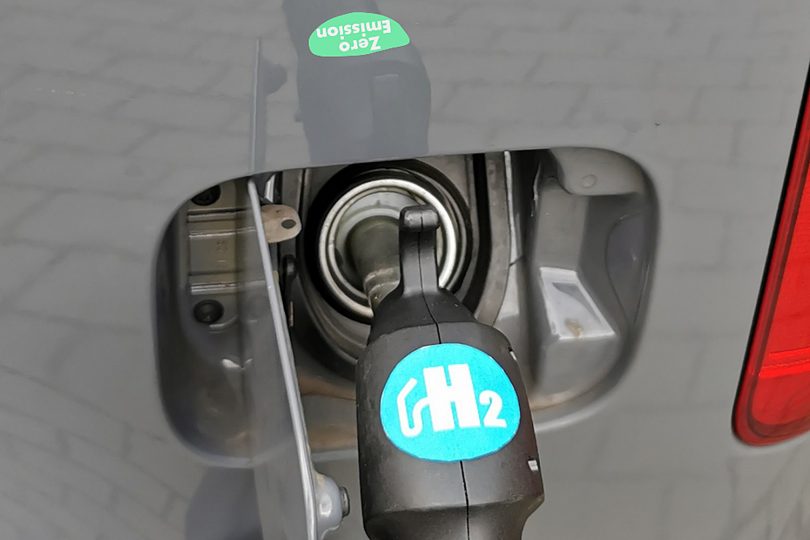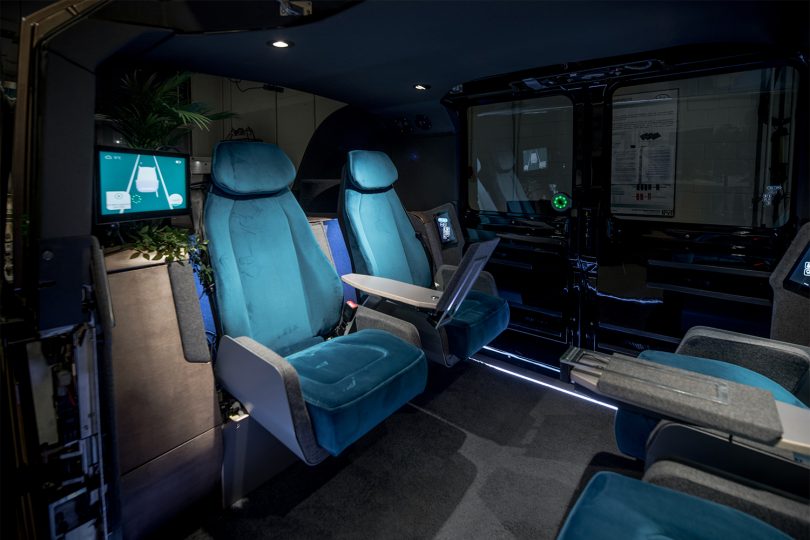Excellent mobility and energy research at the TU Braunschweig Minister of Science Mohrs learns about Future Mobility Hub
- Plans for the Braunschweig Research Airport: Future Mobility Hub as a platform for knowledge transfer and test field
- Hydrogen and fuel cells: H2 terminal and storage put Braunschweig on the energy map
- Necessary changes in the world of work to establish the circular economy
During a visit to the Automotive Research Centre Niedersachsen (NFF) on 20 November, Lower Saxony’s Minister of Science Falko Mohrs gained an insight into current research into the sustainable generation and efficient use of energy production technologies, intelligent and emission-free vehicle concepts and the associated social transformation processes.
An integral part of this is the Future Mobility Hub, which the NFF is setting up as a real-life laboratory for the transformation of the mobility industry. In the future, the hub will be used to explore various possibilities for transforming urban and rural mobility, and to present plans and future visions for the entire environment of the Braunschweig Research Airport with its research facilities and complementary infrastructure.
NFF board spokesman Prof Dr Thomas Vietor: “The planned real-world laboratory will bring together various stakeholders and different disciplines so that they can get to know and understand each other’s interests. Research, the public and public authorities, established companies and the start-up scene can all benefit from the fact that research results will be processed and new processes will be tested, harmonised and expanded. The Braunschweig/Wolfsburg conurbation and the region of south-east Lower Saxony in particular offer ideal conditions for knowledge and technology transfer, as the necessary expertise and capacities are available here.
“Mobility research plays an outstanding role at Technische Universität Braunschweig. The planned Future Mobility Hub is of course a milestone. I am very pleased that the next big step is taking shape: With Mobilise 2.0, we want to deepen the scientific alliance between Braunschweig, Hanover and now also Göttingen. Our goals are, for example, to create synergies in mobility issues and thus reduce complexity, but also to increase the performance of mobility systems through AI and to explore alternative forms of mobility. In short, the mobility of the future is being researched here at all levels in a highly interdisciplinary and internationally visible manner – from an engineering, legal and computer science perspective, from a socio-economic perspective with special consideration of human factors,” says Angela Ittel, President of TU Braunschweig.
“The Future Mobility HUB is a real-world laboratory for investigating different forms of mobility in the future. The NFF plays a central role in electromobility research. Not only application-oriented development is carried out here, but also excellent basic research,” says Falko Mohrs, Lower Saxony’s Minister of Science.
Energy supply: research along the hydrogen efficiency chain
The minister was able to see the first results of this research project during a tour of the NFF technology centre. Timo Sauer from the elenia Institute for High Voltage Technology and Energy Systems explained the hydrogen competence centre currently under construction. The so-called H2-Terminal, which is located in the immediate vicinity of the NFF building, will bundle TU Braunschweig’s research expertise, particularly in the areas of hydrogen production, storage, feed-in and distribution, as well as its conversion into electricity in fuel cells, and put it to practical use.
The green hydrogen produced by the electrolysers using renewable electricity is used in a number of ways. On the one hand, it is used in internal test benches to perform ageing tests with different hydrogen qualities and to decarbonise part of the research work. On the other hand, other external (fuel cell) test benches at the Fraunhofer Project Centre for Energy Storage and Systems (Fraunhofer ZESS) and the NFF are supplied with green hydrogen via a pipeline. In addition to its use in the test benches, the hydrogen will also be used at the NFF site to test hydrogen storage in what is currently the world’s largest metal hydride storage facility operated by GKN Hydrogen. Parallel to the hydrogen supply, the Fraunhofer ZESS, which is also under construction, will be supplied with processed electrolysis waste heat. A high-temperature heat pump will be used to raise the temperature of the waste heat from the electrolysis processes and make it available via a local heating network.
Driverless passenger shuttle planned for real operation from 2024 – vision of a “campus shuttle”
With the RAION test vehicle, the NFF is working under the leadership of the Institute of Automotive Engineering at TU Braunschweig and other partners on the commissioning of a real driverless passenger shuttle in flowing traffic and at high speeds or according to individual customer requirements by mid-2024. “We want to make it possible to experience fully automated driving with a Level 4-certified shuttle under real operating conditions at the Braunschweig Research Airport,” says Professor Roman Henze. The special feature compared to many previous demonstrations is the high – traffic-adapted – speed of 50 km/h. Functional safety is provided by triple redundant systems (two in the vehicle and one secured via the infrastructure).
Circular economy – circular, sustainable, interdisciplinary and humane
With a view to the mobility of the future, the NFF is looking at all areas in addition to the necessary technologies. In addition to zero-emission driving, this also includes the development of a circular economy and transformation processes in the world of work, as Professor Simone Kauffeld explained. The CircularLab of the Battery LabFactory Braunschweig (BLB), which opened at the beginning of November 2023 directly opposite the NFF, and the KREIS competence centre at the NFF will make an important contribution to this.
While the BLB pilot plant will be investigating how lithium-ion batteries can be recycled and how circular production can be implemented, 42 partners from science and industry are researching how work needs to change in order to make a circular economy possible as part of the “KREIS – Circular Economy menschengerecht gestalten” programme funded by the Federal Ministry of Education and Research. “After all, a more sustainable, circular economy requires cooperation between all the disciplines involved, as well as the strengthening of skills and the willingness to change, and more humane working conditions for skilled workers,” says Professor Kauffeld.


